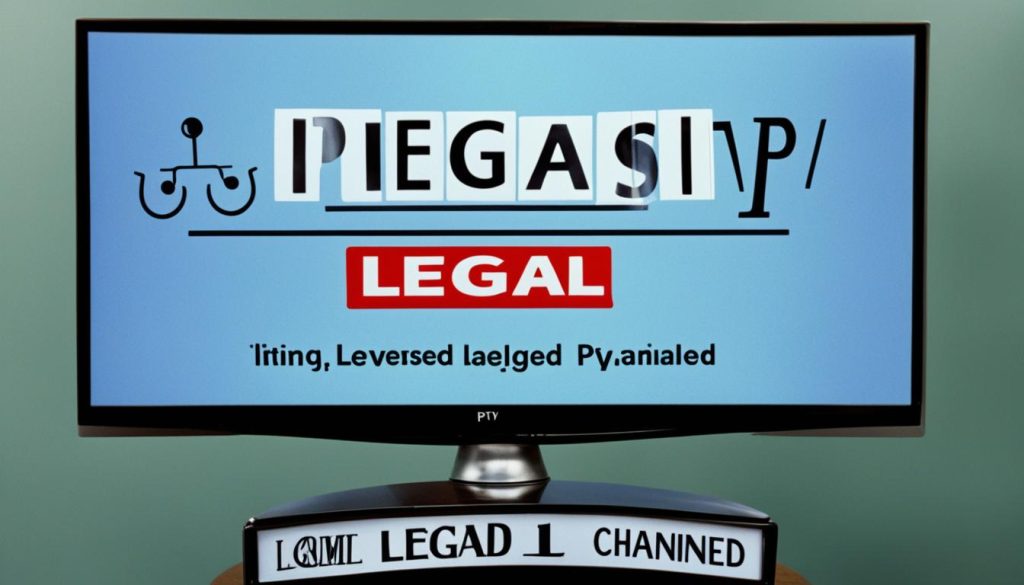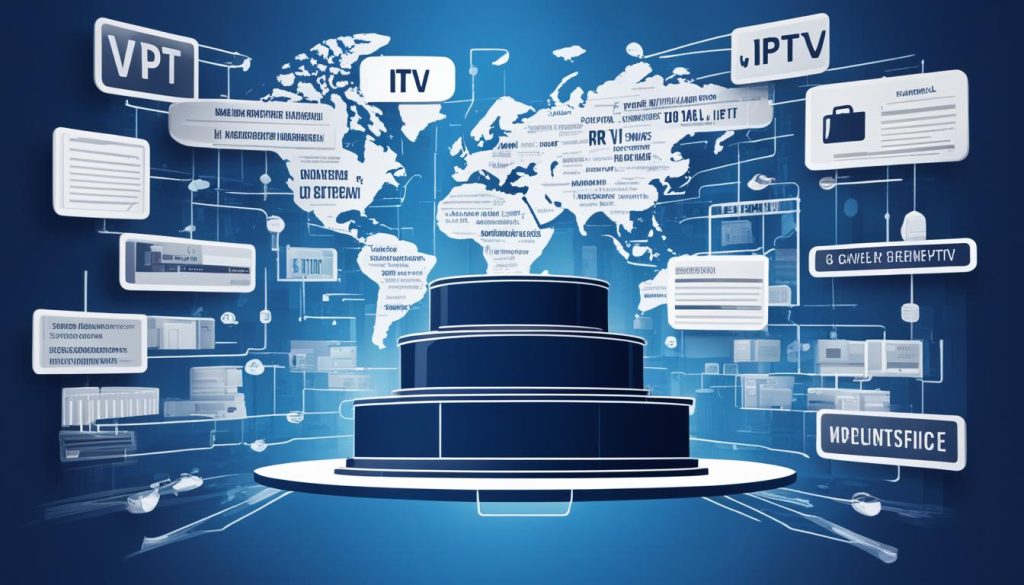IPTV, or Internet Protocol Television, is a popular service that allows users to stream TV shows, movies, and other content over the internet. While IPTV is legal in the UK, not all services are created equal. It is important to understand the legal framework, licensing requirements, broadcasting rules, content restrictions, and advertising standards that govern IPTV services before subscribing to one.
Key Takeaways
- IPTV services in the UK are regulated by various Ofcom IPTV guidelines and EU IPTV directives.
- IPTV providers must comply with copyright laws and obtain the necessary licensing to distribute copyrighted content legally.
- IPTV services are subject to content restrictions and must adhere to advertising standards.
- Understanding the legal framework governing IPTV is crucial for consumers to avoid any potential legal issues.
- Legitimate IPTV providers in the UK must comply with all the relevant regulations and guidelines.
Understanding IPTV
To fully comprehend the world of IPTV, it is essential to delve into its definition and explore how this innovative technology functions. IPTV, which stands for Internet Protocol Television, is a revolutionary approach to delivering television services directly to consumers through the power of the internet.
Definition of IPTV
IPTV is a technology that allows users to access a vast array of television channels, movies, and other video content by leveraging the capabilities of the internet. Unlike traditional television formats, such as terrestrial, satellite, or cable, IPTV utilises the internet’s infrastructure to transmit and stream media directly to the user’s device.
How IPTV Works
At the core of IPTV technology is the ability to encode and deliver video content using the Internet Protocol (IP), the same protocol that underlies the internet itself. This allows IPTV service providers to transmit high-quality audio and video streams, including IPTV live TV and IPTV video-on-demand content, directly to the user’s device, such as a set-top box, smart TV, or mobile device, through a secure and reliable internet connection.
The IPTV service delivery process typically involves the provider’s content distribution network, which ensures efficient and seamless delivery of the IPTV technology to the end-user, providing a smooth and immersive viewing experience.
Legality of IPTV in the UK
The legality of IPTV in the UK is largely determined by the country’s copyright laws. In the United Kingdom, the UK Copyright Law plays a crucial role in regulating the distribution and use of IPTV services.
UK Copyright Law
According to the UK Copyright Law, it is illegal to distribute copyrighted material without the permission of the copyright owner. This means that IPTV providers who offer channels or content that are copyrighted, without the explicit consent of the copyright holder, are breaking the law.
IPTV and Licensing Requirements
To operate legally in the UK, IPTV providers must obtain the necessary licenses and comply with the relevant regulations. This includes securing the appropriate IPTV licensing requirements and ensuring that the content they offer is in line with UK IPTV legality standards.
Legitimate legal IPTV services in the UK are those that have obtained the necessary licenses and are operating within the bounds of the law. Consumers should be cautious when subscribing to IPTV services to ensure they are using a provider that complies with the IPTV licensing requirements and UK copyright regulations.

What are the regulations governing IPTV?
IPTV services are legal in the UK as long as they operate within the bounds of the law. Consumers must be mindful of their responsibilities when using legal IPTV use to avoid any potential legal issues. The UK is home to numerous legitimate IPTV providers that offer their customers lawful services.
Legal Use of IPTV Services
IPTV users in the UK must ensure they subscribe to and use services that comply with copyright laws and licensing requirements. Consuming content from legitimate IPTV providers is the best way to enjoy television programming legally and safely.
Legitimate IPTV Providers
There are reputable IPTV providers in the UK that deliver content through licensed and regulated channels. These legitimate IPTV providers work within the legal framework to offer their customers a wide range of television programming.
Risks of Illegal IPTV Usage
Using illegal IPTV services can expose consumers to significant risks, including copyright infringement, security breaches, and potential legal consequences. Consumers should exercise caution and only use IPTV services that are compliant with relevant laws and regulations.
Enforcement and Regulation
IPTV enforcement is an important aspect of maintaining the legality and integrity of the IPTV landscape in the UK. Regulatory bodies like Ofcom play a crucial role in ensuring IPTV providers adhere to the law and protect consumers from the risks of illegal IPTV usage.
Ofcom's Role
Ofcom’s role in the regulation of IPTV services is essential. As the UK’s communications regulator, Ofcom oversees the implementation and enforcement of laws and guidelines governing the IPTV industry, helping to safeguard consumers and maintain a fair and legal marketplace.
Conclusion
In conclusion, the use of IPTV in the UK is legal as long as it is done through a licensed and reputable service provider. It is crucial to understand and respect copyright laws when streaming television content to avoid any potential legal issues. By choosing a legitimate and licensed IPTV provider, users can enjoy their favourite shows and channels without compromising their legal standing.
However, the use of illegal IPTV services poses significant risks, including copyright infringement, security and privacy concerns, and potential legal consequences. Consumers should exercise caution and only use IPTV services that are regulated and comply with the necessary licensing and content restrictions.
Ultimately, the responsible and informed use of IPTV services in the UK can provide a convenient and enjoyable viewing experience, while ensuring compliance with the law. By understanding the legal framework and choosing reputable providers, IPTV users can fully benefit from the advantages of this evolving technology without compromising their legal rights or exposing themselves to potential risks.
FAQ
What is IPTV?
IPTV stands for Internet Protocol Television. It is a technology that delivers television services over the internet instead of traditional terrestrial, satellite or cable television formats. IPTV services offer users the ability to access a wide range of television channels, movies, and other video content through an internet connection.
Is IPTV legal in the UK?
IPTV is legal in the UK, but not all services are created equal. The legality of IPTV services depends on factors such as the way the content is distributed and whether the service provider has the necessary licences and permissions to offer the content.
What are the legal requirements for IPTV in the UK?
One of the main legal requirements for IPTV in the UK is compliance with the UK Copyright Law. The law states that it is illegal to distribute copyrighted material without the permission of the copyright owner. IPTV providers must ensure they have the necessary licences and permissions to offer the content they provide.
What are the risks of using illegal IPTV services?
Using illegal IPTV services poses significant risks, including copyright infringement, security and privacy concerns, and potential legal consequences. Consumers should exercise caution and only use IPTV services that are regulated and comply with the necessary licensing and content restrictions.
How is IPTV regulated in the UK?
IPTV services in the UK are regulated by Ofcom, the UK’s communications regulator. Ofcom sets guidelines and standards for IPTV providers to ensure they comply with relevant laws and regulations, including copyright laws, advertising standards, and consumer protection measures.



